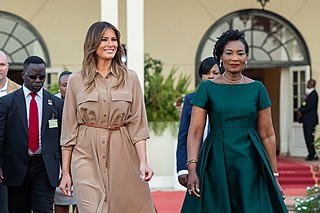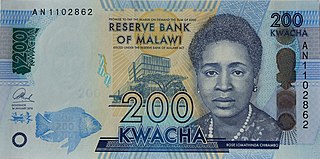Related Research Articles

Malawi, officially the Republic of Malawi, is a landlocked country in Southeastern Africa that was formerly known as Nyasaland. It is bordered by Zambia to the west, Tanzania to the north and northeast, and Mozambique to the east, south and southwest. Malawi spans over 118,484 km2 (45,747 sq mi) and has an estimated population of 19,431,566. Malawi's capital is Lilongwe. Its second-largest is Blantyre, its third-largest is Mzuzu and its fourth-largest is its former capital, Zomba. The name Malawi comes from the Maravi, an old name for the Chewa people who inhabit the area. The country is nicknamed "The Warm Heart of Africa" because of the friendliness of its people.
Music of Malawi has historically been influenced through its triple cultural heritage of British, African, and American music. Malawians have long been travelers and migrant workers, and as a result, their music has spread across the African continent and blended with other music forms. One of the prime historical causes of the Malawian musical melting pot was World War II, when soldiers both brought music to distant lands and also brought them back. By the end of the war, guitar and banjo duos were the most popular type of dance bands. Both instruments were imported. Malawians working in the mines in South Africa and Mozambique also led to fusion and blending in music styles, giving rise to music styles like Kwela.

The University of Malawi (UNIMA) is a public university established in 1965 and until 4 May, 2021, when the university underwent a delinking, was composed of four constituent colleges located in Zomba, Blantyre, and Lilongwe. Of the four colleges, the largest is Chancellor College in Zomba. It is part of the Malawian government educational system. The last Vice-Chancellor was Professor John Kalenga Saka. UNIMA celebrated its golden jubilee from the 24 to the 26 September 2015.
Lucius Chicco Banda, better known by his stage name Soldier Lucius Banda, is a Malawian singer-songwriter, music producer and politician from Balaka, Malawi.

Lesbian, gay, bisexual, and transgender (LGBT) persons in Malawi face legal challenges not experienced by non-LGBT residents.

Madame Callista Chapola-Chimombo is a Malawian politician and the widow of President Bingu wa Mutharika. She served as the First Lady of the Republic of Malawi from 2010 to 2012. Chimombo is a previous member of the Cabinet of Malawi as a National Coordinator of Maternal, Infant and Child Health and HIV/Nutrition/Malaria and Tuberculosis.

The transition from a one-party state to a multi-party democracy significantly strengthened the already cordial U.S. relationship with Malawi. Significant numbers of Malawians study in the United States. The United States has an active Peace Corps program, Centers for Disease Control and Prevention, Department of Health and Human Servicess, and an Agency for International Development (USAID) mission in Malawi. Both countries have a common history and English language, as they were part of the British Empire.
Prison in Chile are generally poor. Prisons often are overcrowded and antiquated, with substandard sanitary conditions.
Nasser Kara is a Malawian politician who was convicted of the murder of his driver in 2002.

As of 2012, approximately 1,100,000 people in Malawi are HIV-positive, which represents 10.8% of the country's population. Because the Malawian government was initially slow to respond to the epidemic under the leadership of Hastings Banda (1966–1994), the prevalence of HIV/AIDS increased drastically between 1985, when the disease was first identified in Malawi, and 1993, when HIV prevalence rates were estimated to be as high as 30% among pregnant women. The Malawian food crisis in 2002 resulted, at least in part, from a loss of agricultural productivity due to the prevalence of HIV/AIDS. Various degrees of government involvement under the leadership of Bakili Muluzi (1994–2004) and Bingu wa Mutharika (2004–2012) resulted in a gradual decline in HIV prevalence, and, in 2003, many people living in Malawi gained access to antiretroviral therapy. Condoms have become more widely available to the public through non-governmental organizations, and more Malawians are taking advantage of HIV testing services.

The history of human rights in Malawi during recent decades is complicated, and the situation at present is in a state of dramatic, and positive, transition.

Evison Matafale was a Malawian Rastafarian whose music rose to popularity in Malawi. He was the founder and leader of the reggae band Black Missionaries. Matafale rose to fame and became one of Malawi's favourite musicians by 2000 through the release of his debut album, Kuimba 1, in 1999 with Wailing Brothers Band. Matafale was known as "the prophet" in Malawi and was seen as an elder amongst the community of Malawian Rastafarians.
The Nation is a newspaper based in Blantyre, Malawi, owned by Nations Publications Limited. It began distribution in 26 July 1993, and became a daily newspaper on 11 July 1994, coming out on Mondays through Fridays. Its sister newspaper Saturday Nation, now called Weekend Nation, was launched in 1995.
Vera Mlangazua Chirwa is a Malawian born lawyer and human and civil rights activist. She was Malawi's first female lawyer and a founding member of the Malawi Congress Party and the Nyasaland African Women's League. She fought for multiparty democratic rule in Malawi and was charged with treason, tried and sentenced to death by President Kamuzu Banda. She spent 12 years on death row. She was married to lawyer Orton Chirwa, Malawian Minister of Justice and Attorney General, who later died in prison.
Professor Peter Nelson Mwanza is a Malawian politician. He was appointed Minister of Lands, Housing and Urban Development in the government of President Bingu wa Mutharika of Malawi on 17 June 2009. He was reassigned to become Minister of Agriculture and Food Security in a cabinet reshuffle on 9 August 2010.

Rose Lomathinda Chibambo was a prominent politician in the British Protectorate of Nyasaland in the years leading up to independence as the state of Malawi in 1964, and immediately after.
Infectious diseases within American correctional settings are a concern within the public health sector. The corrections population is susceptible to infectious diseases through exposure to blood and other bodily fluids, drug injection, poor health care, prison overcrowding, demographics, security issues, lack of community support for rehabilitation programs, and high-risk behaviors. The spread of infectious diseases, such as HIV and other sexually transmitted diseases, hepatitis C (HCV), hepatitis B (HBV), and tuberculosis, result largely from needle-sharing, drug use, and consensual and non-consensual sex among prisoners. HIV and hepatitis C need specific attention because of the specific public health concerns and issues they raise.

Zomba Prison Project is a recording featuring music composed and performed by prisoners at the maximum-security Zomba Central Prison in Zomba, Malawi. The album I Have No Everything Here was produced by Ian Brennan, and nominated in the 2016 Grammy Award for Best World Music Album.

Professor Francis P. B. Moto is a Malawian writer, academic, and diplomat. His home is Golomoti in the Dedza District of Malawi. He attended secondary school in Chichiri in Blantyre and was admitted to the University of Malawi in 1972, obtaining a degree in linguistics in 1977.
Capital punishment in Malawi is a legal punishment for certain crimes. The country abolished the death penalty by a Malawian Supreme Court ruling in 2021, but it was soon reinstated. However, the country is currently under a death penalty moratorium, which has been in place since the latest execution in 1992.
References
- 1 2 3 4 5 6 7 8 9 http://chambo.sdnp.org.mw/ruleoflaw/prisons%5B%5D
- 1 2 Africa News, UN Integrated Regional Information Networks, March 24, 2005.
- ↑ Nyangulu, D., S. Harris A. D. "Tuberculosis In A Prison Population In Malawi" 922140 Correctional Institutions.
- 1 2 3 4 5 6 7 8 9 10 Michael Wines. "Wasting away, A Million Wait In African Jails." New York Times, 6 November 2005, Late Edition (East Coast): 1.1.
- ↑ "Archived copy". www.penalreform.org. Archived from the original on 15 March 2007. Retrieved 6 June 2022.
{{cite web}}: CS1 maint: archived copy as title (link) - 1 2 3 "Cruel prison conditions damage Malawi human rights record, November 5, 2007, Josh Ashaz. www.africanpath.com
- ↑ Africa News, Inter Press Service, ‘Judges Reject Mandatory Death Penalty’.
- ↑ BBC Summary of World Broadcasts; MBC radio, Blantyre, 7 July 1995.
- ↑ BBC Monitoring Africa-Political, Bingu orders the release of about 499 prisoners, July 7, 2007.
- ↑ http://www.malawi.gov.mw/story.php?id=255%5B%5D